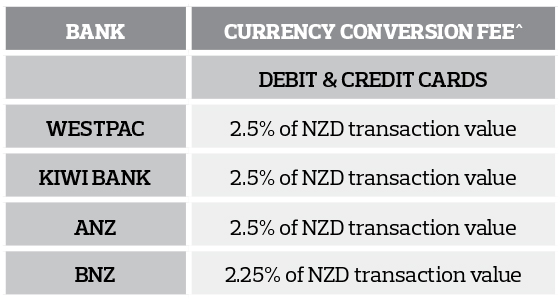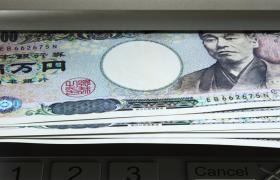Quick Contact

4th April 2017
There’s no doubt if you’re looking for the easiest holiday possible, you might as well use your own bank card. But it’s also the most expensive choice. By opting for convenience, your bank can sit in a swivel-chair and stroke a cat while laughing psychopathically as they rake in all the fees and charges of using your credit card overseas.
Rather than blindly handing your hard-earned money over to your bank, you can make your travel funds stretch further – it just takes a bit of research into your options. And to help out a little, we’ve gone and done some of that research for you!
Currency conversion fees
This bad boy is responsible for most of the extra charges you’ll see on your bank statement after a holiday. It’ll go by a few names up and down the track, such as a foreign transaction fee, foreign currency conversion fee or cross currency conversion fee.
But in short, these are just the bank’s way of charging you for them having to do the transfer to a foreign currency. And it normally works out at around 2.5% of the transaction fee:
Data sourced from mentioned Banks websites- correct as at 23 March 2017
So if you use your debit card overseas to pay $3,000 for a hotel, you’ve instantly spent $75 on currency conversion fees. $100 for dinner, and that’s another $2.50 gone. Over an entire holiday, you can see how this adds up.
How to Avoid Currency Conversion Fees
You hardly need Sherlock Holmes’ help for this one, but the best solution is to avoid using your credit card overseas. You’re better off bringing either the local cash, or a Cash Passport that is preloaded with the right currency. And if you go with someone decent (cough cough*) you won’t get charged currency conversion fees!
*We didn’t cough, we’re just not great at bragging about our ‘no currency conversion fee’ policy.
If you do use your Travel Money Nz Cash Passport overseas, and it isn’t preloaded with the right currency, you can definitely still use it! If it’s a currency we support, it’s a nice and simple conversion to the local currency – no extra fees. If it’s an obscure currency we don’t support though, there are some fiddly fees – all of which you can find on our website.
International ATM Withdrawal Fees
You might want to put the kettle on before heading through the chaos of international ATM fees. These can get complicated.
Overseas ATM fee
This fee is charged by your bank for using an ATM overseas, because you’re conducting a transaction outside of their network of ATMs. Apparently, banks get a little jealous if you cheat on them.
Local ATM owner's fee
TThe local provider that owns the ATM you use overseas can also charge you a fee for using their machine. This fee will be disclosed at the time of transaction, and is set by the provider.
So it’s pretty common to get hit by both the overseas ATM fee, and the local ATM owner’s fee.
Cash Advance Fee
This will already be common knowledge to most credit card holders. But basically, your bank will charge you interest to withdraw cash off your credit card. And, you guessed it – the rates aren’t pretty.
Data sourced from mentioned Banks websites- correct as at 23 March 2017
So let’s just run through a hypothetical scenario where everything went wrong. You use your credit card to withdraw cash from overseas. Instantly, you’re hit by the currency conversion fee, to get your cash converted to the local currency. Then you cop both rounds of ATM fees, from both your bank and the local one. And then you find out that your cash advance had been accruing interest the whole time you were overseas.
At this point, you decide to live in a cave, where credit cards and ATMs can’t find you.
How to Avoid International ATM Withdrawal Fees
Come back! There are easy ways you can dodge these kinds of fees!
- If you use a bank with an international partner, you might dodge some fees (e.g. Westpac has a partnership with Deutsche Bank, Barclay’s, Bank of America and DBS) – so the ATM fees are waived if you stay within a partnered network
- Some ATM providers don’t charge fees, so a bit of research into the local ATMs can save you plenty
- Withdrawing larger sums of cash at once can save you repeatedly paying fees
- NEVER withdraw cash off credit, unless it’s an absolute emergency.
Dynamic Currency Conversion
Thank goodness you put the kettle on before, because this is where it gets complicated.
Dynamic Currency Conversion (DCC) is basically a new system that applies when you use your Australian credit card. Local merchants will ask whether you’d like to pay in the local currency or in Aussie dollars. Most people think that paying with Aussie dollars will let them dodge currency conversion fees.
Queue ‘plot twist’ music.
Nope, you still get fees. In fact, the merchant uses a third party to offer DCC, and that third party has enough strings attached to knit a jumper. The DCC third party sets a pretty poor exchange rate, and then slaps on a fee too. And just for good measure, the merchant adds another fee to the mix.
But, if you opt to pay in the local currency, then you just get the exchange rate offered by the credit card company, as opposed to this rate with a DCC service fee incorporated into it. However, it’ll be a far kinder rate than the DCC third party.
The best thing to do is opt to pay in the local currency. That way, you don’t end up in this fresh new jumper of fees.
Your best option
You’ve probably noticed the strong correlation between using your bank card overseas and fees. But the good news is that exchange services like Travel Money Oz can save you plenty of hassle (and money!).
You can set up a currency alert – so you get an email when the foreign currency you need hits your desired exchange rate.
Then when you need to pick up your cash, simply pop into any of our 130 Travel Money Oz stores across the country, all filled with FXperts ready to help you with your foreign exchange. And did we mention we’re fee and commission free on all cash transactions?
Find your nearest store, and start saving cash on your holiday today!
^ ^ Some ATM operators may charge an additional withdrawal fee. Fee information for Westpac, Kiwi Bank, ANZ and BNZ as per their respective website pages on Fees and Charges. The Multi-currency Cash Passport™ (“Cash Passport”) is an unsecured debt security issued by Travelex Card Services Limited, a member of the Travelex group. Cash Passport is not guaranteed by any member of the Travelex group or any other entity. Before you make a decision to acquire a Cash Passport, we recommend you to read the Product Disclosure Statement which is available free of charge at www.cashpassport.co.nz. MasterCard® and the MasterCard Brand Mark are registered trademarks of MasterCard International Incorporated. This blog is provided for information only and does not take into consideration your objectives, financial situation or needs. You should consider whether the information and suggestions contained in any blog entry are appropriate for you, having regard to your own objectives, financial situation and needs. While we take reasonable care in providing the blog, we give no warranties or representations that it is complete or accurate, or is appropriate for you. We are not liable for any loss caused, whether due to negligence or otherwise, arising from use of, or reliance on, the information and/or suggestions contained in this blog.














